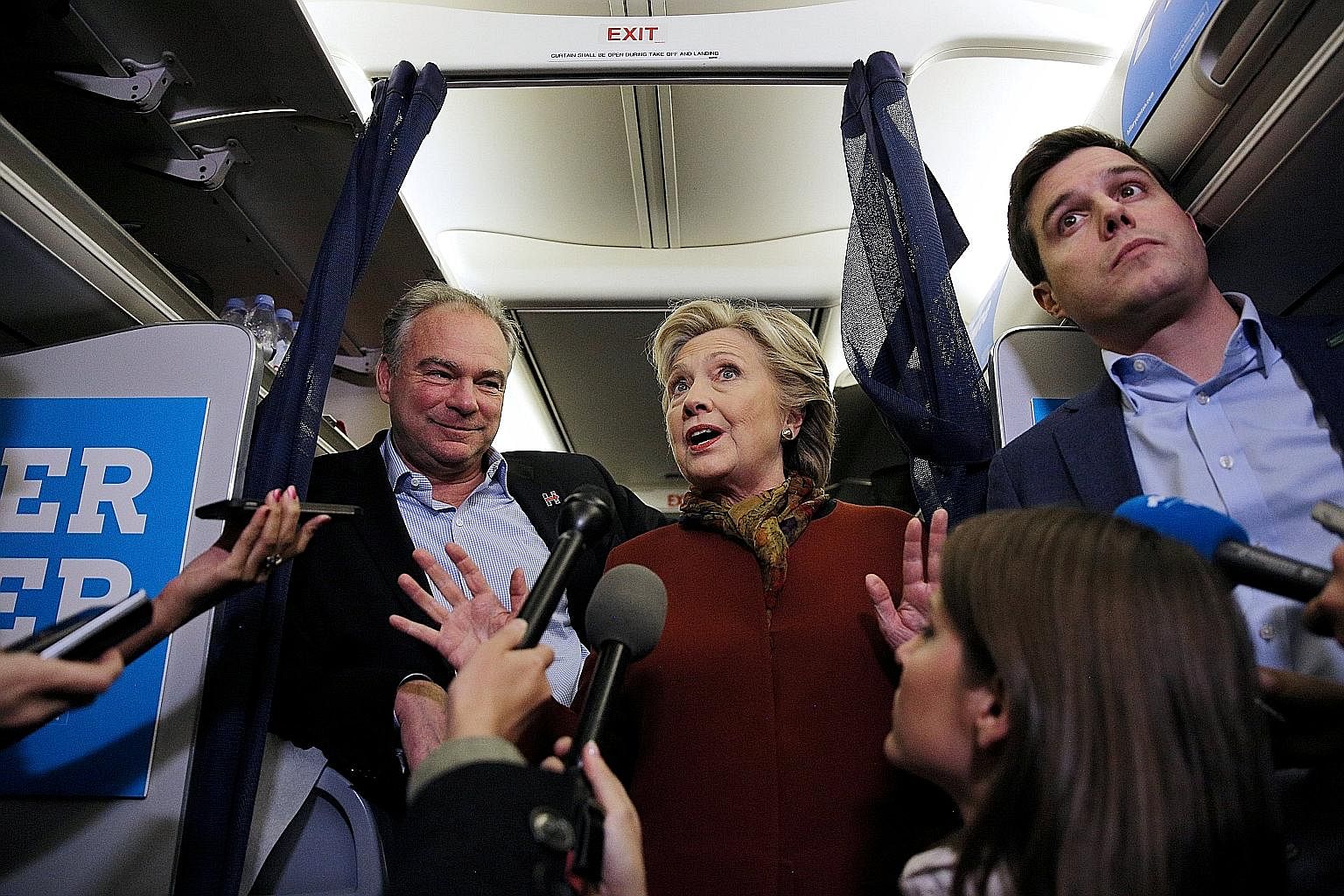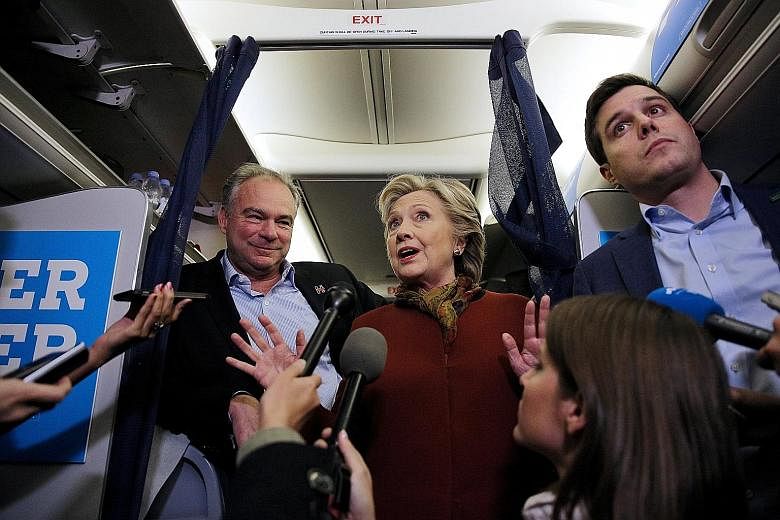On a rainy morning in Singapore, watching TV screens blaze with scenes of a steely Mrs Hillary Clinton in Des Moines, Iowa, facing a possible resurrection of the probe into her e-mail, I remembered another breach - of which I seemed to have had a largely undeserved premonition.
It was a chilly day in 2007 as I trailed the impervious Clinton train, also in Iowa. She was then making her first bid for the White House. Her campaign had just been caught planting a question from what was purported to be a randomly picked member of the audience.
Mr John Dickerson, who now anchors CBS' Face The Nation on Sunday, was also trailing her at the time. He recounted the incident thus: "I was at the bio-diesel plant in Newton, Iowa, when Hillary Clinton was asked the now-famous question that had been set up by her staff. We had just finished a tour of the facility where Clinton nodded, as all candidates do, while officials spoke so that the cameramen wearing hard hats could film her standing among tubes and vats… Then Clinton gave a nearly hour-long policy speech before taking questions from the audience. Nineteen-year-old Muriel Gallo-Chasanoff asked: 'As a young person, I'm worried about the long-term effects of global warming. How does your plan combat climate change?'"
Mr Dickerson continued: "I didn't think the question was a plant at the time. It sounded a little general and pre-rehearsed, but a lot of town-hall questions sound that way. Days before the controversy broke, Bhagyashree Garekar, a correspondent for Singapore's Straits Times, asked me if I thought the questions had been planted at Clinton events we had both attended. I said I didn't think so. No candidate would be so stupid.
"When news broke that at least one had been, I called Garekar to ask what had tipped her off, since she hadn't made it to the Newton event. 'This is common practice in many foreign countries, particularly India,' she said. What was supposed to be a free-flowing exchange sounded rehearsed to someone with first-hand knowledge of the practice."
But I was referring to more than a matter of planting questions. Journalists in India - I used to work in New Delhi and Mumbai - are instinctively programmed to respond with distrust to every spectacle that presents itself in a political campaign. Not that there is special competence within the profession, it is more that cynicism is the norm, a sad reflection of the endemic corruption.

So looking back to that chilly Iowa afternoon nine years later, I can confirm that I was carrying no special lie detector, just avid curiosity to understand how American politics works. What I did take away was that journalism needs some work too.
As is steadily becoming apparent, that holds especially true for the 2016 US election season. This cycle, several of journalism's sacred cows have been put out to pasture.
Just last week, Mr Dean Baquet, executive editor of the New York Times (NYT), shredded CNN and Fox News for short-changing the audience and democracy by mixing news with entertainment.
Fox's sin was pandering to partisan viewers. CNN, in Mr Baquet's books, has erred by hiring a former Trump campaign manager as a commentator.
CNN has barely recovered from claims that its political commentator Donna Brazile, a Democratic activist, had shared in advance a town-hall question for Mrs Clinton. Ms Brazile, who now heads the Democratic Party's governing body, has denied this ever happened and suggested that Russian hackers could have tampered with her leaked e-mail to Clinton campaign officials.
While blasting the "ridiculous" role being played by TV news networks, Mr Baquet, however, made no mention of a questionable little flap in his own backyard, at the NYT newsroom. Mr Mark Leibovich, the chief national correspondent for The New York Times Magazine, said recently he did no wrong when he agreed to a demand from the Clinton campaign to lop off some bits from a profile published last year.
The circumstances in which he got his interview for the profile are more than a little controversial. He had been granted an off-the-record interview with Mrs Clinton after he failed to persuade her to sit down for one that could be published.
That in itself rings alarm bells. Off-the-record briefings are conducted by newsmakers involved in key events - for example, by officials involved in an important negotiation who may want to lay out the finer details of negotiating positions. These can jeopardise talks if made public. The most a reporter can hope for from a briefing from a candidate running for office is some kind of revelation, such as that she has a radically new policy position or a strategic bit of information pertaining to the nuts and bolts of a campaign.
There is no journalistic exigency for confidentiality in a situation largely driven by the need for a private individual to attain a political end. By participating in such a meeting, a journalist is being drawn into a fight with clearly drawn-up sides. He is on the inside of one side.
In a rebuttal, Mr Leibovich conceded it was "unusual" and "felt slightly weird" but said he agreed to the arrangement if only to have a chance in person to persuade Mrs Clinton for a real interview. But after the meeting , he chose to ask: Could he please report it, giving the campaign the option to review the transcript and clarify what it did not want aired? The Clinton campaign could not have got a better deal if it had tried.
Mr Leibovich's backstory came to light when hacked e-mail from the Clinton campaign surfaced on WikiLeaks. The trove snared another top name at Politico, a website that is hugely influential among the Washington elite. Mr Glenn Thrush, the chief political correspondent, e-mailed a chunk of his story to the Clinton campaign chief to check. "Because I have become a hack I will send u the whole section that pertains to u," Mr Thrush wrote.
Concern over media objectivity has spilled over to the public square. Almost 40 per cent of likely voters surveyed by Suffolk University/ USA Today in a poll last week said they think the media is coordinating with the campaigns; three-quarters said they had no doubts that the media would like to see Mrs Clinton elected. And to nearly half of them, "the primary threat that might try to change the election results" came not from Russian hackers or rigged polls, but from the news media.
Surveys are no purveyors of universal truths but they at least lay some popular beliefs in the open.
Here's another piece of the puzzle: A public watchdog found that journalists donated nearly US$400,000 (S$556,700) to 2016 political campaigns, and 96 per cent went to Mrs Clinton.
On the surface, there are a few conflicts of interest at the boardroom level in some media giants. The largest individual shareholder of the New York Times Company is Mr Carlos Slim, the Mexican tycoon who has in the past donated over US$250,000 to the Clinton Foundation. He was reported to have called off a contract with a Trump firm after the Republican nominee called Mexicans drug-runners and rapists.
The other storied American newspaper, The Washington Post, is owned by Amazon's Jeff Bezos. Mr Trump has threatened action against Amazon, which he has likened to a monopoly, if elected president. The Post has had a number of investigative scoops against Mr Trump. It also broke the story that threatened to sink his candidacy: a misogynistic, profanity-laced videotape.
There is no suggestion here that any ethical standards were bent but the fact remains that unlike a judge, who is also supposed to be impartial, journalists or newspapers do not have the authority of the state behind them. They depend on hard-won credibility, gained over decades but susceptible to being undone over weeks or months.
Partly it's an occupational hazard. When journalists travel with an actor in an unfolding news drama, it is easy to buy into their subject's legitimacy. In fact, it is hard not to. This implicit bias was demonstrated during the Iraq war of 2003, to which we owe the newly minted journalistic term "embed", and which saw scores of reporters riding shotgun with the US military. Before the war, the US media cheered on the Iraq invasion, which they now hold was a mistake.
Is the media on a different track now? In an Oct 11 article, also by Mr Leibovich, we find an account of attempts by reporters to get a little more from Mrs Clinton while they are aboard her campaign plane. Honouring a tradition popular in the Ronald Reagan days, one of them rolls a clementine up the aisle with this question written on it: Would Clinton rather have dinner with Trump or Vladimir Putin?
The answer rolls back, with Mr Putin's name circled. All reporters immediately tweet out this bit of breaking news. Except, hold on! The campaign had thought that was off the record too. Why did the reporters put it out?
Mr Leibovich recounts that the campaign immediately comes back with a story - that strikes me as barely plausible. Don't you know, the clementine had not even rolled up to candidate Clinton? It was picked up by a campaign aide, who read the question out to Mrs Clinton. Mrs Clinton had never said she preferred to have dinner with Mr Putin over Mr Trump. She had only said that she once had dinner with Mr Putin.
The travelling press corps dutifully tweets out this correction.


